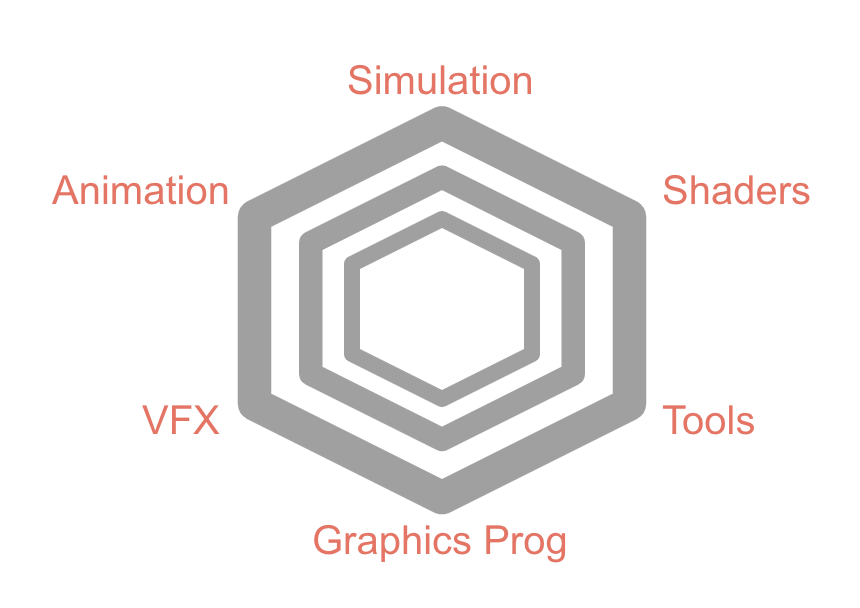What Technical Artists do?
2023-01-06

Technical Artist is a not very well known role inside the game (and film/media) industry. Halfway between programmers and artists, is not always easy to know what we do.
To shine light on this mystery, I have determined the 6 things Technical Artist do. Why 6? Because I like hexagons! As you can see this is a personal opinion, don't take it seriously. If you ask other technical artists, they will all have wildly different answers. Each aspect is kinda porous, some are related to others, and there's always specialized roles for each.
Shaders
Also knows as materials, shaders are probably the main thing people think when they hear Technical Artist.
A shader is a program that runs on your GPU.
Think of most shaders as instructions on how to paint the things you see on your screen. Characters, environments, post processing are all done through shaders. Technical Artist write them, and tweak their parameters. They are not the only members of the team that interact with them, but when you have troubles, they are your people.
Tools
This encompasses custom tooling inside the software used by the team and standalone programs. Also known as pipeline. Basically anything from asset generation to how the final game assembly. Frequently includes Continuous Integration duties.
Continuous Integration means code that runs each time the codebase is modified. It is usually not run inside your machine, but on a server somewhere inside a dark closet.
Also managing the VCS for the team, specially for heavy files such as images or models.
VCS stands for version control system, and it's the software developers use to share code amongst them. Think of it like advanced Dropbox for code.
Simulation
Sometimes we have to portray complex systems like water or realistic smoke. These are impossible to run fast enough on average phones. That's why they are simulated ahead, recorded, and used in the game as a sprite sheet, alembic, or other formats for pre-computed geometry or images. Most of Technical Artists work on film is on this side.
VFX
Every explosion in the game, every puff of smoke or splash of water is a combination of different disciplines. But visual effects are more than the sum of its parts. They require additional skills such as timing, synchronization, and optimization to name a few.
Animation
Animation has become such an big part of the media we consume. The animations of today require complex rigs, machine learning, inverse kinematics, and more. To help animators in all of this tasks, TAs set up tools and systems so they can focus on the animations, and we take care of those heavy systems.
Graphics Programming
Getting your game running at fast speed on the device usually required intimate knowledge of the underlying APIs that expose the hardware. Not only that, but porting to new systems, or debugging nasty bugs. Think of working on shaders as the high level side, and this as closer to metal.
Others
There are many other skills that don't fit into this totally made up hexagon. Mostly because they are transversal, such as Procedural Generation, Performance Improvement, Guideline creation, and many more.
But if there is one skill that needs to be mentioned, one skills that all TAs share, the most important one.
Empathy
TAs are communicators, they must speak the different languages of the team. Understand the sometimes conflicting needs of teams to find a common solution. All others skills are optional, and most of us won't ever be considered experts in half of them. But being the bridge between people is the one we can't ever forget about.
Conclusion
Here's a handy table with the recap of today
| Field | Software | Specialization |
|---|---|---|
| Shaders | Game Engine, Substance Designer | Shader wizard |
| Tools | Everything | Tool engineer |
| Simulation | Houdini, Blender, Maya | Render engineer |
| Vfx | Houdini, JangaFX, 3d software, Game Engine | VFX artist |
| Animation | Maya, 3ds Max, Blender, Mixamo | Technical Animator |
| Graphics Programming | Renderdoc | Graphics programmer |
As you can see it's kind of messy. I don't intend for this particular view of our role to be a industry standard. No need to turn this into an instrument for interviews. This is just my personal view, and I wanted to share it so you can compare.
Do you agree? Disagree? Reach out to me at @alvarber.
Till next time!